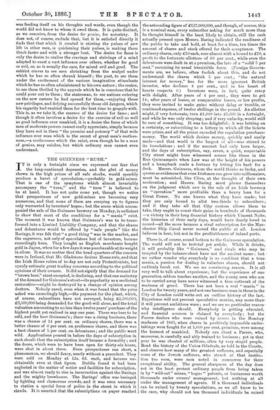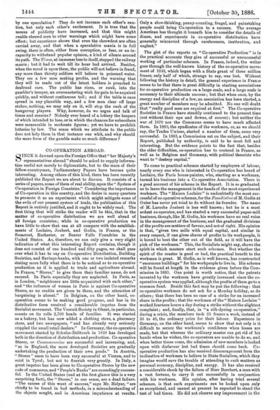THE GUINNESS "RUSH."
IT is only a fortnight since we expressed our fear that the long-continued depression, and the glut of money shown in the high prices of all safe stocks, would speedily produce a burst of speculation,—probably in gold-mines. That is one of the symptoms which almost invariably accompany the "turn," and the " turn " is believed to be at hand. It has not quite come yet, though we notice that prospectuses of new gold-mines are becoming very numerous, and that some of them are creeping up to figures only warranted by investors' hopes ; but the scene which accom- panied the sale of the Guinness brewery on Monday, is sufficient to show that most of the conditions for a " mania " exist. The moment it was known that Guinness's was to be trans- formed into a Limited Liability Company, and that the shares and debentures would be offered by "safe people" like the Barings, it was felt that" a good thing" was in the market, and the eagerness, not only of speculators but of investors, became exceedingly keen. They bought as English merchants bought gold in Japan, when for a few days it was purchasable at its weight in silver. It was no matter that the head-quarters of the concern were in Ireland, that Mr. Gladstone desires Home-rule, and that the Irish Home rulers of to-day are not only Protectionists, but openly estimate great trading concerns according to the political opinions of their owners. It did not signify that the demand for "brown beer," stout excepted, is declining, and that one mainstay of the demand for Guinness's stout—its popularity as a medicinal restorative—might be destroyed by a change of opinion among doctors. Nobody cared, even when it was found that the price asked was exceedingly high,—the payment for the plant, which, of course, subscribers have not surveyed, being 22,500,000, 23,500,000 being demanded for the good-will alone, and the total valuation amounting to no less than twelve years' purchase of the highest profit yet realised in any one year. There was beer to be sold, and the beer Guinness's ; there was a rising business, there was a chance of 14 per cent, on ordinary shares, there was a better chance of 6 per cent, on preference shares, and there was a best chance of 5 per cent. on debentures ; and the public went wild. Applications poured in before the days of subscription in such shoals that the subscription itself became a formality ; and the doors, which were to have been open for thirty-six hours, were shut in about three. Even prospectuses ran short, a phenomenon, we should fancy, nearly without a precedent. They were sold on Monday at 12s. 6d. each, and became un- obtainable even at that figure. Dublin found it had been neglected in the matter of notice and facilities for subscription, and was almost ready to rise in insurrection against the Barings and the mighty brewhonse. The Barings' office was besieged by fighting and clamorous crowds, and it was even necessary to station a special force of police in the street in which it stands. It is asserted that the subscriptions on paper reached
the astounding figure of 2127,000,000, and though, of course, this is a nominal sum, every subscriber asking for much more than he thought himself in the least likely to obtain, still the cash actually pressed upon Messrs. Baring indicated the readiness of the public to take and hold, at least for a time, ten times the amount of shares and stock offered for their acceptance. The ordinary shares, only 210 each, rose almost with a bound to 216, profit to the fortunate allottees of 60 per cent., while even the debentures were dealt in at a premium, the lure of a "solid 5 per cent." exercising its usual irresistible force. (Foreign Govern- ments are, we believe, often foolish about this, and do not understand the charm which 5 per cent., "the natural interest for money," has for the more ignorant British investor, who declines 4 per cent., and in his heart of hearts suspects 6.) Investors were, in fact, quite crazy with delight, After years of 4 per cent., they were to get 14; after years of losses, or comparative losses, or low profits, they were invited to make gains without delay or trouble, or continued expense, of twelve shillings in the pound. An allottee might, if very fortunate, turn 21,000 into 21,600 in a fortnight, and while he was only sleeping; and if very unlucky, would still be sure of something. It was too delightful ; it was betting on a certainty, or subscribing to a lottery in which all the tickets were prizes, and all the prizes exceeded the regulation purchase- money. The world which desires money, quickly and easily made—and that world is the largest of all—was stirred to its foundations ; and if the amount had only been larger, and the days of subscription, say, seven, a quiet, respectable City street might have witnessed scenes like those in the Rue Quincampoix when Law was at the height of his powers and a humpback made a fortune by letting his back for a desk. Messrs. Guinness, whom the world thinks so lucky, and quotes as evidences that even Irishmen can grow into millionaires, must be astonished, like Clive, at the thought of their own. moderation ; and Messrs. Baring must plume themselves on the judgment which saw in the sale of an Irish brewery an " operation " more profitable than a heavy loan for a Great Power. No one knows what they have made ; but they are only bound to allot two-thirds to subscribers ; and if they take all that City custom allows them to take, they ought to count their gains in hundreds of thousands —a victory in their long financial history which Vincent Nolte, the historian of their early days, would have dearly loved to record—all the more because a rival subscription for the Man- chester Ship Canal never moved the public at all. London believes in beer, but not in the profitableness of inland ports.
There is, of course, sound bottom to the Guinness speculation. The world will not be teetotal yet awhile. While it drinks, it will probably like "Guinness," and rivals who may be tempted by the balance-sheet have not the ancient name ; but - we rather wonder why everybody is so confident that a true • mania, a passion for dealing in valueless shares, should not suddenly break out. We see no convincing reason. It is all very well to talk about experience ; but the experience of one generation seldom teaches another, and the young men who are to be carried away have never witnessed a true outbreak of the madness of greed. There has not been a real " mania " in London for twenty years, and not one business-man in three in the City of London could write out an outline history of the last. Experience will not prevent speculative manias, any more than it will prevent ambitious wars ; and we see no particular reason. why intelligence should. Everybody is getting educated; and financial acumen is claimed by everybody ; but the Parsee dealers who were ruined by scores in the Bombay madness of 1863, when shares in positively impossible under- takings were fought for at 1,600 per cent. premium, were among the keenest of mankind. Nobody can cheat a Parsee, who, moreover, is carefully and ably trained to business ; yet in that year he was cheated of millions, often by very stupid people. Read the history of the Union G6nerale, as told in the Court*, and observe how many of the greatest sufferers, and especially some of the Jewish sufferers, who struck at that institu- tion too soon, were men noted in commerce for their exceptional ability. The general sharpness of the day does not in the least protect ordinary people from being taken in by "wild-cat" mines, " bogus " patents, or businesses worth thousands under owners' management, but nothing at all under the management of agents. If a thousand individuals can be ruined by twenty speculations, as we all know to be the case, why should not ten thousand individuals be ruined by one speculation ? They do not increase each other's cau- tion, but only each other's excitement. It is true that the means of publicity have increased, and that this might enable shrewd men to utter warnings which might have some effect; but experience shows that even the shrewdest are often carried away, and that when a speculative mania is in full swing, there is often, either from corruption, or fear, or an in- capacity to withstand popular opinion, a kind of silence around its path. The Times, at immense loss to itself, stopped the railway mania ; but it had to wait till its hour had arrived. Besides, when the mood is upon them, the public will not believe in fraud, any more than thirsty soldiers will believe in poisoned water. They see a few men making profits, and the warning that they will be made out of the latest holders is preached to deafened ears. The public has risen, or sunk, into the gambler's temper, an overmastering wish for gain to be acquired quickly, and without continuous toil ; and if the table is once spread in any plausible way, and a few men clear off large stakes, nothing, we may rely on it, will stop the rush of the hungering players. Why, however, do we argue and talk of times and seasons Nobody ever heard of a lottery the keepers of which intended to lose, or in which the chances for subscribers were measurable in moderate figures ; yet we have to prohibit lotteries by law. The sense which we attribute to the public does not help them in that instance one whit, and why should the mere form of the gamble make so much difference ?





































 Previous page
Previous page